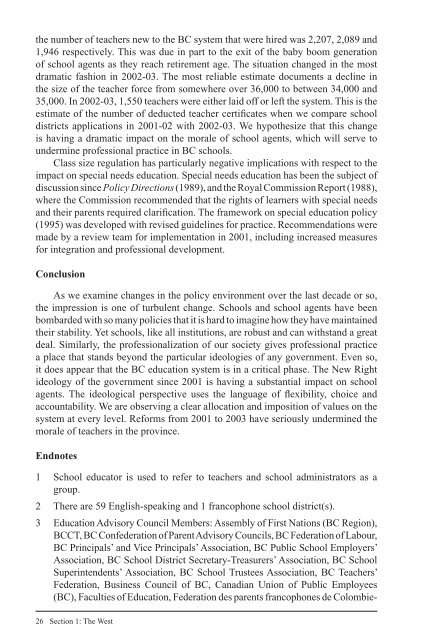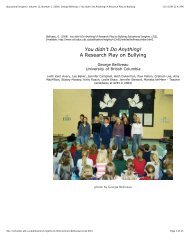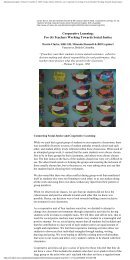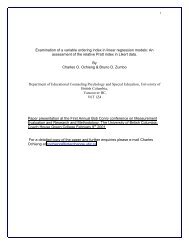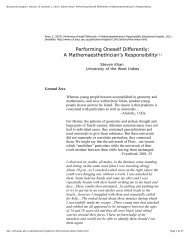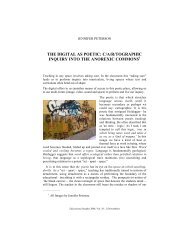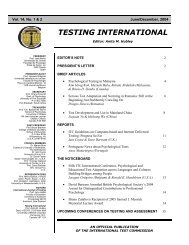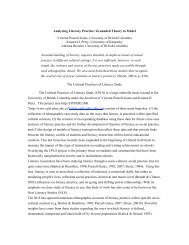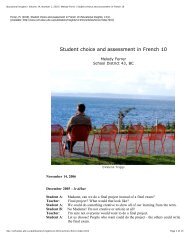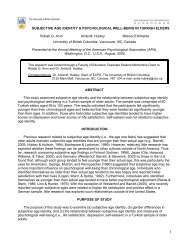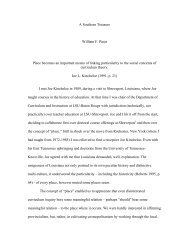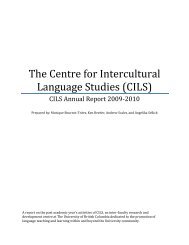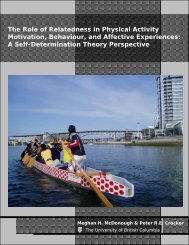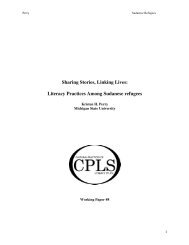The evolution of professionalism - Centre for Policy Studies in ...
The evolution of professionalism - Centre for Policy Studies in ...
The evolution of professionalism - Centre for Policy Studies in ...
Create successful ePaper yourself
Turn your PDF publications into a flip-book with our unique Google optimized e-Paper software.
the number <strong>of</strong> teachers new to the BC system that were hired was 2,207, 2,089 and<br />
1,946 respectively. This was due <strong>in</strong> part to the exit <strong>of</strong> the baby boom generation<br />
<strong>of</strong> school agents as they reach retirement age. <strong>The</strong> situation changed <strong>in</strong> the most<br />
dramatic fashion <strong>in</strong> 2002-03. <strong>The</strong> most reliable estimate documents a decl<strong>in</strong>e <strong>in</strong><br />
the size <strong>of</strong> the teacher <strong>for</strong>ce from somewhere over 36,000 to between 34,000 and<br />
35,000. In 2002-03, 1,550 teachers were either laid <strong>of</strong>f or left the system. This is the<br />
estimate <strong>of</strong> the number <strong>of</strong> deducted teacher certifi cates when we compare school<br />
districts applications <strong>in</strong> 2001-02 with 2002-03. We hypothesize that this change<br />
is hav<strong>in</strong>g a dramatic impact on the morale <strong>of</strong> school agents, which will serve to<br />
underm<strong>in</strong>e pr<strong>of</strong>essional practice <strong>in</strong> BC schools.<br />
Class size regulation has particularly negative implications with respect to the<br />
impact on special needs education. Special needs education has been the subject <strong>of</strong><br />
discussion s<strong>in</strong>ce <strong>Policy</strong> Directions (1989), and the Royal Commission Report (1988),<br />
where the Commission recommended that the rights <strong>of</strong> learners with special needs<br />
and their parents required clarifi cation. <strong>The</strong> framework on special education policy<br />
(1995) was developed with revised guidel<strong>in</strong>es <strong>for</strong> practice. Recommendations were<br />
made by a review team <strong>for</strong> implementation <strong>in</strong> 2001, <strong>in</strong>clud<strong>in</strong>g <strong>in</strong>creased measures<br />
<strong>for</strong> <strong>in</strong>tegration and pr<strong>of</strong>essional development.<br />
Conclusion<br />
As we exam<strong>in</strong>e changes <strong>in</strong> the policy environment over the last decade or so,<br />
the impression is one <strong>of</strong> turbulent change. Schools and school agents have been<br />
bombarded with so many policies that it is hard to imag<strong>in</strong>e how they have ma<strong>in</strong>ta<strong>in</strong>ed<br />
their stability. Yet schools, like all <strong>in</strong>stitutions, are robust and can withstand a great<br />
deal. Similarly, the pr<strong>of</strong>essionalization <strong>of</strong> our society gives pr<strong>of</strong>essional practice<br />
a place that stands beyond the particular ideologies <strong>of</strong> any government. Even so,<br />
it does appear that the BC education system is <strong>in</strong> a critical phase. <strong>The</strong> New Right<br />
ideology <strong>of</strong> the government s<strong>in</strong>ce 2001 is hav<strong>in</strong>g a substantial impact on school<br />
agents. <strong>The</strong> ideological perspective uses the language <strong>of</strong> fl exibility, choice and<br />
accountability. We are observ<strong>in</strong>g a clear allocation and imposition <strong>of</strong> values on the<br />
system at every level. Re<strong>for</strong>ms from 2001 to 2003 have seriously underm<strong>in</strong>ed the<br />
morale <strong>of</strong> teachers <strong>in</strong> the prov<strong>in</strong>ce.<br />
Endnotes<br />
1 School educator is used to refer to teachers and school adm<strong>in</strong>istrators as a<br />
group.<br />
2 <strong>The</strong>re are 59 English-speak<strong>in</strong>g and 1 francophone school district(s).<br />
3 Education Advisory Council Members: Assembly <strong>of</strong> First Nations (BC Region),<br />
BCCT, BC Confederation <strong>of</strong> Parent Advisory Councils, BC Federation <strong>of</strong> Labour,<br />
BC Pr<strong>in</strong>cipals’ and Vice Pr<strong>in</strong>cipals’ Association, BC Public School Employers’<br />
Association, BC School District Secretary-Treasurers’ Association, BC School<br />
Super<strong>in</strong>tendents’ Association, BC School Trustees Association, BC Teachers’<br />
Federation, Bus<strong>in</strong>ess Council <strong>of</strong> BC, Canadian Union <strong>of</strong> Public Employees<br />
(BC), Faculties <strong>of</strong> Education, Federation des parents francophones de Colombie-<br />
26 Section 1: <strong>The</strong> West


